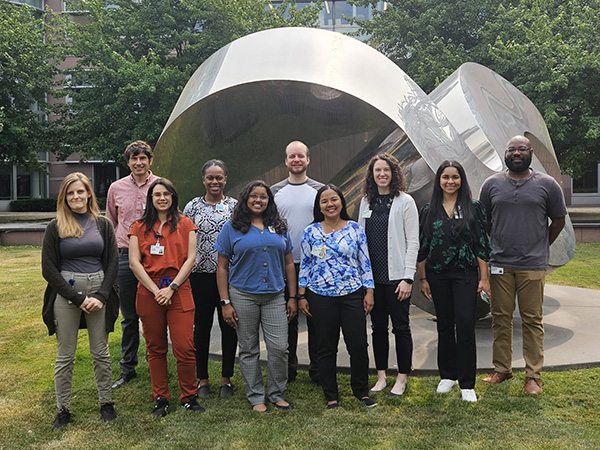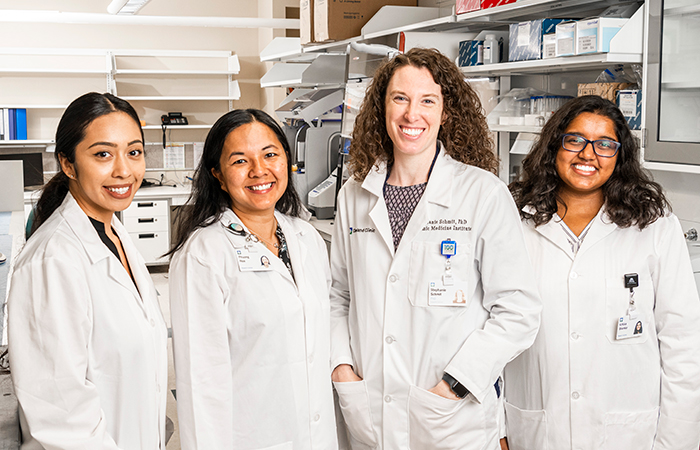Stephanie Schmit Laboratory
-
Stephanie Schmit Laboratory
- Principal Investigator
- Research
- Our Team
- Publications
- Careers
- Research News

Stephanie Schmit, PhD, MPH
Associate Staff
Email: [email protected]
Location: Cleveland Clinic Main Campus
Research
As a cancer epidemiologist, Dr. Schmit’s transdisciplinary research studies the factors that influence colorectal cancer (CRC) across the continuum from etiology to survivorship at the population level. Combining wet and dry lab approaches, research in the Schmit lab implements integrative molecular epidemiology methods and statistical genetic approaches to better understand the roles of germline and somatic genetics, host immune responses, lifestyle factors, and environmental variables in CRC development and the modulation of disease progression and outcomes. Her research revolves around 3 major themes: Genetic epidemiology, Tumor-associated immune responses, and gaps in health outcomes.
Biography
Stephanie Schmit, PhD, MPH, is the principal investigator of the Schmit Lab. She studied molecular epidemiology at the University of Michigan School of Public Health, where she obtained her MPH and PhD. In the area of genetic epidemiology, her research focuses on identifying novel CRC susceptibility loci through sample size expansion of existing genome-wide association studies (GWAS), rare variant analyses with Bayesian methods, and fine-mapping studies. She recently led the analysis of one of the largest GWAS of CRC susceptibility conducted to date with the Colon Cancer Family Registry (CCFR), the Colorectal Transdisciplinary (CORECT) study, and the Genetics and Epidemiology of Colorectal Cancer Consortium (GECCO), and she has been productively collaborating with CCFR investigators for over a decade. Another important focus of her work is investigating biological factors that influence CRC disparities in racial/ethnic minority populations, and she serves as PI or MPI on two related R01s focused on Hispanics/Latinos. Recently, her work has also expanded into examination of young-onset CRC through her affiliation with the new Edward J. Bartolo Jr. Center for Young-Onset Colorectal Cancer at the Cleveland Clinic.
Education & Professional Highlights
"CIMER Trained Mentor" indicates the principal investigator has completed mentorship training based on curriculum from the Center for the Improvement of Mentored Experiences in Research, aimed at advancing mentoring relationships and promoting cultural change in research.
Research
Overview

Genetic epidemiology
To understand the genetic contributors to both the etiology and outcomes of CRC, Dr. Schmit collaborates with consortium collaborators to identify low-penetrance susceptibility loci, build trans-racial/ethnic polygenic risk scores to inform targeted screening recommendations and study the influence of somatic genetics on CRC outcomes.
Tumor-associated immune responses
Dr. Schmit’s work and that of other groups supports that host immune responses in the tumor microenvironment influence CRC progression independent of microsatellite instability status. The Schmit lab investigates the epidemiology of these CRC-associated immune responses and the impact of immune infiltration on overall and disease-specific survival. The goal is to understand the germline genetic, epidemiologic and clinical factors that shape the strength and diversity of immune responses that differ substantially across CRCs diagnosed at the same stage and how this information can be used to improve patient outcomes.
Health disparities
CRC in certain racial/ethnic minority populations has been found to occur at a younger age, potentially be less responsive to therapy and have poorer prognosis after adjusting for sociodemographic factors. An important focus of the Schmit lab integrates work in the areas of genetic epidemiology and tumor-associated immune responses to better understand biological (i.e. genetic, immune-related) contributors to CRC disparities and how these factors might inform the development of interventions to improve health outcomes across racial/ethnic populations, with a particular focus on Hispanic/Latino populations. The Schmit lab serves as the coordinating center for the Latino Colorectal Cancer Consortium, drawing Hispanic/Latino participants from multiple contributing studies across the nation.

The Latino Colorectal Cancer Consortium (LC3)
In this NCI funded project, we collaborate with the Hispanic Colorectal Cancer Study, the Puerto Rico Biobank, and the Moffitt Cancer Center Total Cancer Care cohorts. The overarching goals of this project are to build an infrastructure that ensures Hispanic/Latino patients are represented in genomic and molecular studies of colorectal cancer, identify biological contributors to CRC outcomes in Latinos taking into account genetic ancestry, and investigate biological determinants of colorectal cancer disparities. Our transdisciplinary team is uniquely positioned to address the emerging hypothesis that ancestral genetic haplotypes shape tumor mutational profiles that contribute to outcome disparities in Latinos.
The Colon Cancer Family Registry (CCFR)
CCFR (https://www.coloncfr.org/) is an international consortium of institutes across the United States, Canada, and Australasia formed in 1997 as a resource to support studies on the etiology, prevention, and clinical management of colorectal cancer. CCFR is the largest single family-based resource in the world for the study of colorectal cancer (and other cancers, such as endometrial cancer, that occur in these families). The resource comprises data and biospecimens from over 42,000 participants from more than 15,000 families that have been recruited from 1998 to 2011. The CCFR has supported and facilitated over 200 scientific projects, many including collaborations with other top CRC groups in the world, and has generated over 400 publications to date.
The Cleveland Clinic Latino Epidemiology (CCLE) Cohort
In partnership with the Mata Lab, we aim to build a prospective cohort of Latino patients from northeast Ohio and Florida CCF locations with Parkinson’s disease, colorectal cancer, and healthy individuals, highlighting the ability to leverage CCF’s diverse and large patient population across CCF to study disease-specific genetic risk factors.
Our Team
Selected Publications
View publications for Stephanie Schmit, PhD, MPH
(Disclaimer: This search is powered by PubMed, a service of the U.S. National Library of Medicine. PubMed is a third-party website with no affiliation with Cleveland Clinic.)
Careers
The Schmit Lab is always looking for passionate and creative trainees, including undergraduate students, graduate students, medical students, postdocs, and clinical residents or fellows. Please reach out to Dr. Schmit with any specific inquiries at [email protected].
At this time, we are particularly seeking post-doctoral fellows with interest and expertise in epidemiology, gaps in health outcomes, genomics, bioinformatics, EHR data analytics, or a related field. If you are interested in learning more about available opportunities, please email your CV and a cover letter describing your interests and background to [email protected].
Training at Lerner Research Institute
Our education and training programs offer hands-on experience at one of the nationʼs top hospitals. Travel, publish in high impact journals and collaborate with investigators to solve real-world biomedical research questions.
Learn MoreResearch News

Insights from the first patients treated with PD-1 and PD-L1 immune checkpoint inhibitors for their metastatic colorectal cancer reinforced and built on successful clinical trial results.

The interactive web map shows screening priority zones across the United States.

Immune responses to young-onset colorectal cancer involve a broader range of immune cells than average-onset responses, opening the door to investigate tailored therapies for both groups.

Sharing genomic data for more than 100,000 colorectal cancer cases helps researchers discover 155 high-confidence genes linked to disease risk.

The VeloSano Trainee Dream Experiment Fellowship and Caregiver Catalyst Grant program have provided the trainees with funding to pursue their novel cancer research projects.

Dr. Schmit and colleagues identified geographic hot and cold spots of young-onset colorectal cancer mortality in the United States in order to highlight regions for further investigation and future preventive interventions.

Dr. Schmit’s team will study the role of genetic ancestry in shaping immune-related determinants of colorectal cancer outcomes.

Dr. Schmit and colleagues found that immune cell infiltration of colorectal tumors can predict disease relapse in patients who undergo surgery with curative intent.